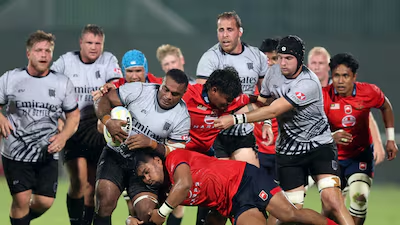In a groundbreaking move, Qatar, the United Arab Emirates (UAE), and Saudi Arabia are collaborating on a joint bid to host the Rugby World Cup in 2035. This initiative, supported by Asia Rugby, aims to bring the prestigious tournament to the Middle East for the first time, showcasing the region’s growing enthusiasm and capacity for hosting major sporting events.
A Vision for Rugby’s Expansion
Asia Rugby President Qais Al-Dhalai has been a vocal advocate for bringing the Rugby World Cup back to Asia. Reflecting on Japan’s successful hosting in 2019, Al-Dhalai emphasized the potential of Middle Eastern nations to deliver an exceptional tournament.
“The Middle East is witnessing a large appetite for different sports and now we are witnessing a lot for rugby,” he stated. He highlighted that countries like Qatar, the UAE, and Saudi Arabia possess the infrastructure and commitment necessary to host such a significant event.
Building on a Legacy of Major Events
The Gulf region has a proven track record of hosting international sporting events. Qatar’s successful organization of the 2022 FIFA World Cup demonstrated its capability to manage tournaments of this scale. The existing infrastructure, including state-of-the-art stadiums and transportation networks, positions these nations as strong contenders for hosting the Rugby World Cup.

The UAE, home to the annual Dubai Sevens tournament, has long been a rugby hub in the region. The event attracts over 100,000 visitors and features some of the world’s top teams. Saudi Arabia has also been investing heavily in sports, including football, Formula 1, and golf, as part of its Vision 2030 strategy. Hosting the Rugby World Cup would further solidify its status as a global sports destination.
Addressing Challenges and Opportunities
Despite the promising prospects, the joint bid faces several challenges. One significant hurdle is that none of the Gulf states have previously participated in the Rugby World Cup. This could necessitate adjustments to World Rugby’s hosting criteria to allow a region without a strong competitive history in the sport to stage its biggest event.
Additionally, scheduling the tournament during the cooler months of December and January would be essential to ensure player and spectator comfort. This would require coordination with the global rugby calendar, which typically schedules the tournament between September and November.
Human rights considerations are also at the forefront of discussions. Critics have raised concerns about labor practices and freedoms in the region, emphasizing the need for transparency and reforms to align with international standards. Addressing these issues will be crucial for the bid’s credibility and acceptance on the global stage.
Financial Commitment and Strategic Partnerships
The financial backing from these wealthy Gulf nations is a significant advantage. Qatar Airways’ recent sponsorship deal for international rugby events exemplifies the region’s commitment to investing in the sport. This partnership includes hosting future rugby tournament finals in Doha, highlighting Qatar’s strategic approach to becoming a central hub for rugby events.
The Middle East’s economic powerhouses have demonstrated their willingness to allocate substantial resources to sports development. Saudi Arabia, for example, has been aggressively acquiring major sporting rights, while the UAE continues to expand its footprint in global sports. The Rugby World Cup bid aligns with their long-term vision of diversifying their economies and boosting tourism through high-profile events.
Global Rugby Community’s Perspective
The international rugby community has shown openness to expanding into new markets. New Zealand Rugby’s chief executive, for instance, expressed willingness to consider playing matches in the Middle East, acknowledging the region’s growing interest and financial investment in the sport. However, he emphasized the need for thorough understanding and careful consideration before making such decisions.

In contrast, traditional rugby nations may view the bid with skepticism. Countries with a strong rugby heritage, such as England, South Africa, and Australia, have historically been favored for hosting rights. Convincing World Rugby that a Middle Eastern tournament could enhance the sport’s global reach will be a key challenge.
A Call for Fair Representation
Al-Dhalai has also highlighted concerns regarding World Rugby’s current voting system, which favors traditional rugby powerhouses. He advocates for a more equitable structure that would allow emerging rugby nations, like those in the Middle East, to have a fair say in the sport’s governance.
“If we keep doing business as we have for the last 20 years then don’t expect a change,” he remarked, emphasizing the need for a revolutionary approach to leadership within World Rugby. A successful bid could accelerate this shift and encourage more investment in rugby development across Asia and the Middle East.
Conclusion
The proposed joint bid by Qatar, the UAE, and Saudi Arabia to host the 2035 Rugby World Cup represents a bold step toward diversifying the sport’s global footprint. Leveraging their experience in hosting major events, substantial financial resources, and a growing passion for rugby, these Gulf nations present a compelling case. However, addressing logistical challenges, human rights concerns, and advocating for fair representation within World Rugby will be essential to turn this ambitious vision into reality.
If successful, the Middle East could emerge as a new rugby powerhouse, inspiring future generations and expanding the game beyond its traditional strongholds. Whether World Rugby is ready to embrace such a transformative shift remains to be seen, but one thing is certain—the Gulf nations are serious about making their mark on the sport.
Beckhams Dazzle at Buckingham Palace’s Exclusive State Banquet [PHOTO]



